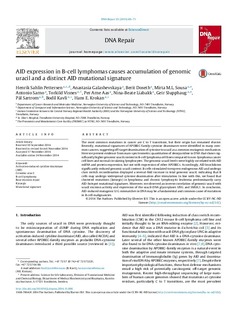| dc.contributor.author | Pettersen, Henrik Sahlin | |
| dc.contributor.author | Galashevskaya, Anastasia | |
| dc.contributor.author | Doseth, Berit | |
| dc.contributor.author | Sousa, Mirta | |
| dc.contributor.author | Sarno, Antonio | |
| dc.contributor.author | Visnes, Torkild | |
| dc.contributor.author | Aas, Per Arne | |
| dc.contributor.author | Liabakk, Nina-Beate | |
| dc.contributor.author | Slupphaug, Geir | |
| dc.contributor.author | Sætrom, Pål | |
| dc.contributor.author | Kavli, Bodil Merete | |
| dc.contributor.author | Krokan, Hans Einar | |
| dc.date.accessioned | 2015-01-07T07:56:36Z | |
| dc.date.accessioned | 2016-04-06T14:20:29Z | |
| dc.date.available | 2015-01-07T07:56:36Z | |
| dc.date.available | 2016-04-06T14:20:29Z | |
| dc.date.issued | 2014 | |
| dc.identifier.citation | DNA Repair 2014, 25:60-71 | nb_NO |
| dc.identifier.issn | 1568-7864 | |
| dc.identifier.uri | http://hdl.handle.net/11250/2384342 | |
| dc.description.abstract | tThe most common mutations in cancer are C to T transitions, but their origin has remained elusive.Recently, mutational signatures of APOBEC-family cytosine deaminases were identified in many com-mon cancers, suggesting off-target deamination of cytosine to uracil as a common mutagenic mechanism.Here we present evidence from mass spectrometric quantitation of deoxyuridine in DNA that shows sig-nificantly higher genomic uracil content in B-cell lymphoma cell lines compared to non-lymphoma cancercell lines and normal circulating lymphocytes. The genomic uracil levels were highly correlated with AIDmRNA and protein expression, but not with expression of other APOBECs. Accordingly, AID knockdownsignificantly reduced genomic uracil content. B-cells stimulated to express endogenous AID and undergoclass switch recombination displayed a several-fold increase in total genomic uracil, indicating that Bcells may undergo widespread cytosine deamination after stimulation. In line with this, we found thatclustered mutations (kataegis) in lymphoma and chronic lymphocytic leukemia predominantly carryAID-hotspot mutational signatures. Moreover, we observed an inverse correlation of genomic uracil withuracil excision activity and expression of the uracil-DNA glycosylases UNG and SMUG1. In conclusion,AID-induced mutagenic U:G mismatches in DNA may be a fundamental and common cause of mutationsin B-cell malignancies. | nb_NO |
| dc.language.iso | eng | nb_NO |
| dc.publisher | Elsevier | nb_NO |
| dc.rights | Navngivelse 3.0 Norge | * |
| dc.rights.uri | http://creativecommons.org/licenses/by/3.0/no/ | * |
| dc.title | AID expression in B-cell lymphomas causes accumulation of genomic uracil and a distinct AID mutational signature | nb_NO |
| dc.type | Journal article | nb_NO |
| dc.type | Peer reviewed | nb_NO |
| dc.date.updated | 2015-01-07T07:56:36Z | |
| dc.source.volume | 25 | nb_NO |
| dc.source.journal | DNA Repair | nb_NO |
| dc.identifier.doi | 10.1016/j.dnarep.2014.11.006 | |
| dc.identifier.cristin | 1191987 | |
| dc.description.localcode | © 2014 The Authors. Published by Elsevier B.V. This is an open access article under the CC BY-NC-NDlicense (http://creativecommons.org/licenses/by-nc-nd/3.0/). | nb_NO |

